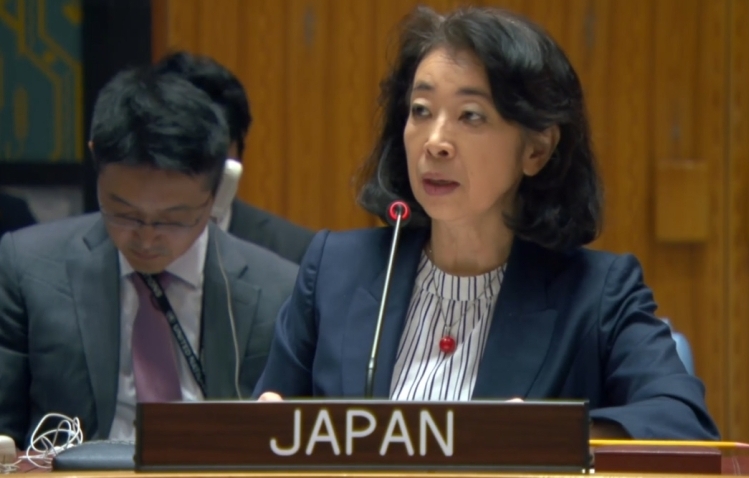中央アフリカ情勢に関する安保理会合における志野大使ステートメント
令和5年10月26日

I would like to express my gratitude to SRSG Rugwabiza for her briefing. I welcome the presence of Her Excellency, Foreign Minister Baïpo-Temon from the Central African Republic (CAR) and the representative of Angola.
Let me begin by expressing sincere appreciation to all MINUSCA peacekeepers for their contributions.
CAR is now at a critical juncture in its state-building efforts following the referendum on the new constitution. To bring the country back onto the path towards sustainable peace and development, full implementation of the 2019 Political Agreement for Peace and Reconciliation (APPR) remains the highest priority. Promotion of political and socioeconomic reintegration, especially in local areas, is the key to reduce any recurrence of armed violence and improve the plight of people on the ground.
We continue to apprehend the human rights violations and abuses committed by armed groups, State agents and other security personnel, which were mentioned in the recent SG report as allegedly responsible. The more than twofold increase from the previous reporting period in the number of conflict-related sexual violence and grave violations against children is alarming, and those must stop.
Today, I would like to highlight the following three points.
The first is the primacy of a political solution through inclusive dialogue. We are encouraged by the continuous efforts of the CAR Government, including the APPR follow-up meeting recently organized by President Touadéra, to engage with armed groups in the Disarmament, Demobilization, Reintegration and Repatriation (DDRR) process. This process is time-consuming and requires trust-building among various stakeholders as well as local support. To that point, we welcome the decentralization efforts by the SRSG in supporting local mechanisms to revitalize conflict prevention, mediation, and the return of armed groups to the peace process. Such ground-level engagement will help expand state authority in remote areas.
Second, regional cooperation is essential for sustainable stability in CAR and the neighboring countries. The annex maps in the SG’s report clearly illustrate the presence of grave concentrations of armed group activities and illicit flows of weapons. We commend the efforts of the Government of CAR to develop more effective long term border management systems with MINUSCA’s support. The state’s presence and the rule of law on both sides of the country’s borders are a prerequisite to overcome the challenges caused by the porous borders. We welcome close engagement by the CAR authority with neighboring countries.
The influx of refugees is another cause of instability in the border areas. Displaced people from Chad and Sudan are facing human security crisis despite the commendable efforts of the CAR Government to host them in its communities. It has compounded the already dire humanitarian situation within CAR itself and requires further assistance from the international community. In this respect, Japan continues to provide food assistance in partnership with WFP to alleviate human suffering.
Finally, advancing democratic processes throughout the country is essential to strengthen central and local governance. The suspended preparations for the local elections have resumed with specific targeted voting dates. Any election process should be fair, open, inclusive, and credible so that people can exercise their political rights freely, which over the long term will help heal any divisions in the country.
We will actively engage in the incoming discussion on the extension of the current mandate of MINUSCA.
I thank you.
